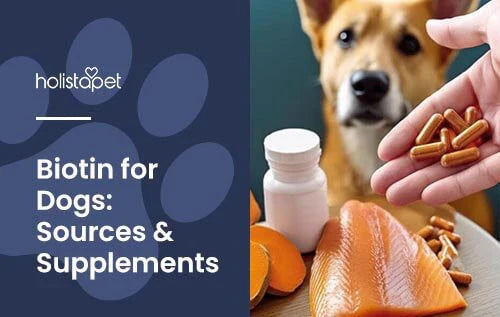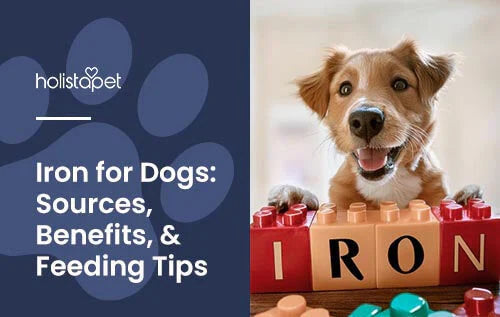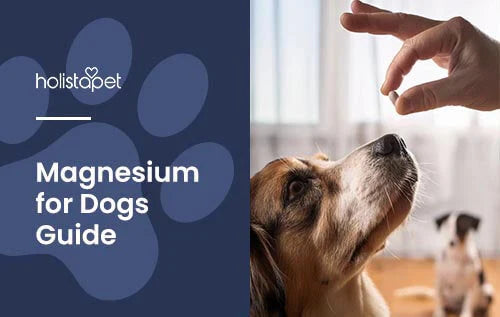With biotin for dogs, you can unlock your dog's pawtential for a radiant coat and inner glow. Also known as vitamin B7 or vitamin H (with the "H" representing its role in promoting hair and skin health), biotin is a vital nutrient many dog owners might not know much about. It promotes skin health, supports metabolism, and much more.
As a pet parent, it's important to make sure your dog gets enough biotin, either from food or supplements. Our guide will teach you all about this essential vitamin, including its benefits, food sources, and proper dosage. Read on to find out more.
What Is Biotin?
Biotin falls under the category of B vitamins and is sometimes referred to as vitamin B7 (or H). This nutrient is key in helping the body turn food into energy. It also helps maintain healthy hair, skin, and nails. For dogs, biotin is important not only for their appearance but also for their well-being.
Biotin helps dogs metabolize fat and protein efficiently. This vitamin is naturally produced in their bodies. However, sometimes, they might need an extra boost from food or supplements to avoid biotin deficiencies. This case is especially true for puppies, older dogs, and those with certain health issues.
Can Dogs Take Biotin?
Absolutely! Biotin is safe for canines and can be a valuable part of every dog's diet. Vitamin B7 helps maintain healthy skin, strengthen nails, and ensure shiny fur.
Most commercial dog foods contain some biotin. However, that might not be enough, especially if your dog has specific health needs or is recovering from an illness. That's where biotin supplements come in. These wellness products are widely available, so you can keep stock to ensure your dog never runs low.

How May Biotin Benefit Dogs?
Biotin is a powerhouse vitamin offering many health benefits. Here are some of the key ways it can help your four-legged friend:
- Healthy Skin and Coat. Biotin is vital for maintaining skin health and producing a shiny coat.
- Strong Paws and Nails. It helps strengthen dogs' nails and paws, making them less prone to breakage and damage.
- Proper Digestion. It aids in the metabolism of fat and protein, necessary for proper digestion.
- Muscle Composition. It helps synthesize proteins that contribute to muscle growth and repair.
- Immune Support. It supports the immune system, helping to fend off illnesses and infections.
Healthy Skin and Coat
Biotin helps improve your dog's skin and coat. Many dog owners report an improvement in their pet's coat and skin after starting biotin.
The vitamin aids in the regeneration of skin cells and helps repair any damage. Healthier skin is more resistant to skin conditions and infections, reducing dryness, itching, and irritation.
Moreover, vitamin H promotes the growth of a thicker, shinier coat and helps control excessive shedding. With enough biotin, you may notice less dog hair around the house and on your clothing.
Related Post: Which Dog Shampoo for Itchy Skin?
Strong Paws and Nails
Biotin can help strengthen your dog's paws and nails. Dogs that spend a lot of time running or walking on hard surfaces can experience wear and tear on their paws and nails, but vitamin B7 can help reduce this damage.
Stronger nails mean your dog can enjoy their playtime and walks without discomfort. Biotin also supports the health of the paw pads, ensuring they remain supple and resilient against rough surfaces.
Proper Digestion
Biotin is key for proper digestion and metabolism in dogs. Pets with enough of this vitamin are characteristically more energetic and active.
A diet rich in vitamin B7 supports a healthy gut. This means your pup will experience fewer instances of stomach upset or poor nutrient absorption.
While not a direct treatment, biotin can support dogs with thyroid issues. Biotin helps dogs' bodies effectively break down fats and proteins. This metabolical process is key for turning the food dogs eat into usable energy.
Muscle Composition
Biotin helps canines' bodies use proteins needed for muscle growth and repair. Puppies who are still growing and active adult dogs can greatly benefit from this vitamin.
Good muscle tone and strength mean your pet can run, jump, and play more easily. Strong muscles help pets stay mobile and energetic throughout their lives.
Immune Support
Biotin helps support the immune system, protecting pets from illnesses and infections. Vitamin B7 contributes to this by helping regulate immune cells' functions and maintaining a strong skin barrier. This barrier serves as the first line of defense against external threats.
When dogs are not deficient in this biotin, their bodies are better equipped to fight off sickness and recover more quickly from illness. This nutrient aids in the overall resilience of dogs so that they can quickly bounce back from any health challenges.
Related Post: Ironclad Health: Iron for Dogs Guide
What Signs Could Indicate Biotin Deficiency in Dogs?
Biotin deficiency in dogs can lead to several noticeable problems. If you notice any of these symptoms, talk to your vet about possibly adjusting your pet's diet or adding a supplement:
- Dull, Thin Coat. If your dog's fur looks less shiny and thinner than usual, it could signify biotin deficiency.
- Skin Issues. Keep an eye out for dry, flaky skin or rashes, indicating deficiency.
- Weak Nails. If your dog’s nails break easily or seem weaker, they may lack biotin.
What Causes Biotin Deficiency in Dogs?
Biotin deficiency in canines is uncommon, but it can occur and lead to various health issues. Here are some of its causes:
- Poor Diet. If a dog's diet lacks enough vitamins or is not well-balanced, it might not provide the necessary levels of biotin.
- Genetic Factors. Some dogs might have a genetic predisposition that affects their ability to properly absorb or use biotin.
- Health Issues. Certain health issues or medications (like antibiotics) can interfere with nutrient absorption, leading to a deficiency.
How To Address Biotin Deficiency in Dogs?
Addressing biotin deficiency in dogs involves dietary adjustments or supplementation. Here’s what you can do:
- Review the Diet. Look at your dog’s daily feed and make sure it includes biotin-rich foods or enough variety.
- Supplementation. Consider supplements if your dog's diet isn't meeting their biotin needs. They are usually easy to mix into foods and can provide quick help.
- Consult a Veterinarian. Always consult a vet before changing your dog's diet or using supplements. They can provide guidance based on your dog's specific situation.

What Are Common Dog-Safe Food Sources of Biotin?
Biotin is in a variety of food sources that are safe for dogs. Here are some of the best foods to include in your dog's meal plan:
- Liver. One of the richest sources of biotin, liver (especially beef) is both nutritious and appealing to canines.
- Eggs (Particularly the Yolk). Cooked eggs are best to avoid salmonella risk and neutralize avidin. Avidin is a protein in raw egg whites that inhibits biotin absorption.
- Salmon. Salmon is a rich source of vitamin B7 and omega-3 fatty acids, and it helps with skin and coat health.
- Dairy Products. Small amounts of cheese or yogurt can provide both vitamin B7 and calcium.
- Vegetables. Some vegetables, like sweet potatoes and carrots, contain biotin, other vitamins, and fiber.
What Biotin Supplements Are Available for Dogs?
Adding biotin supplements as a complementary feed can enhance your dog’s diet. Here are the types of products available:
- Soft Chews. These are easy to administer as most dogs treat them like a treat. Your dog might even like our HolistaPet Skin, Coat, & Nail Soft Chews, which contain biotin and other great ingredients.
- Powders. This can be conveniently sprinkled over your dog's regular food.
- Liquid Supplements. Mix these into your dog’s water or drizzle them over their food for easy ingestion.
- Multivitamin Supplements. Some multivitamins designed for dogs include vitamin B7, among other important vitamins and minerals.
How Do I Choose the Right Biotin Supplement for My Dog?
Biotin supplements sourced from nature can be a healthy addition to your pet’s diet. Look for products that contain pure biotin without any unnecessary additives. If they contain other helpful ingredients like omega-3 fatty acids, even better.
Also, consider the form of the supplement — whether your dog might prefer chews, powders, or liquids. The right form can make it easier for you to give the product regularly.
Additionally, take some time to read reviews from other dog owners. Their purchase experiences can tell you a lot about how effective and tasty a product is for pets.
More importantly, contact your vet. They can suggest the best product based on your dog’s age, body weight, health, and dietary needs.
You can shop for high-quality biotin supplements at pet stores or online. Before you purchase a biotin supplement, make sure you've done the recommended steps above.
Browse all Holistapet supplements for dogs
How Much Biotin Should I Give My Dog?
Biotin dosage will depend on your dog's size, weight, diet, and health condition. The correct dosage can support your dog's skin, coat, and overall health without causing any side effects.
Supplements come with dosage guidelines, but these should align with your dog's specific situation. Your vet can help you understand these guidelines and adjust the dosage as needed.
Can Dogs Overdose on Biotin?
It is rare for dogs to overdose on biotin. Unlike some fat-soluble vitamins, biotin is water-soluble. This means that excess amounts can safely exit the body through urine (rather than build up in the body).
Giving too much vitamin B7 can sometimes lead to minor issues, such as skin rashes or digestive upset. These are uncommon, but it's good to be aware of them.
Are There Any Side Effects?
Biotin is generally well-tolerated by dogs, and side effects are rare. However, like with any wellness product, there's a small chance that some dogs might experience mild side effects. The most common side effects include allergic reactions like skin rashes or digestive issues like diarrhea.
Biotin for Dogs - A Recap
Biotin is essential for your dog's health, helping with their skin, coat, nails, digestion, muscles, and immune system. Thanks to this guide, you can better understand how to support your furry pal's health using this key vitamin.
Check out our shop for our Skin, Coat, & Nail Soft Chews and other products that your furry buddy will love. Together, we can make sure your pet remains happy, healthy, and active.







![Probiotics For Dogs [Soft Chews] - HolistaPet](http://www.holistapet.com/cdn/shop/files/Probiotic-Infographic-1_472d7a29-e30c-435a-9638-1365d8c3a9f9.jpg?v=1725384841&width=104)




























Leave a comment
All comments are moderated before being published.
This site is protected by hCaptcha and the hCaptcha Privacy Policy and Terms of Service apply.